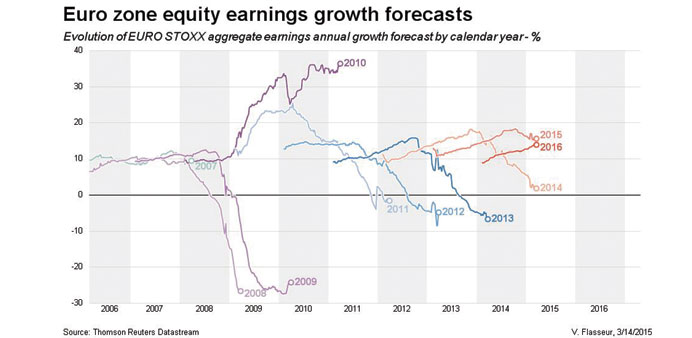Reuters
London
The euro’s slide towards parity with the dollar will provide a much-needed boost for European companies this year and force US rivals to adapt their businesses or risk losing market share.
While currency hedging arrangements mean the benefits may not be seen straight away, the currency’s weakness has already cheered European chief executives by making their products cheaper overseas and lifting the value of dollar-based sales.
“We have been handicapped by the strength of the euro, but now it seems that the wind is turning and we intend to make the most of this very positive currency effect that will help us deliver a nice increase of our sales and our profits in 2015,” Jean-Paul Agon, CEO of French cosmetics group L’Oreal told investors last month.
Other companies predicting a tail wind from the around 20% drop in the value of the euro over the past six months to $1.06 on Friday include jet manufacturer Airbus, German car and truck maker Daimler and French engineering groups Schneider Electric and Alstom.
Some US companies also see positives from the weaker euro, including lower borrowing costs, better performance at European units which export, stronger demand from eurozone-based customers and, for the leisure sector, increased travel into the continent.
However, most US groups that discussed the currency in recent weeks including Apple, Dupont, Priceline, Caterpillar and General Electric, have warned they may face headwinds in Europe and elsewhere, and some, including Xerox, have cut earnings guidance as a result.
These companies have said they are now looking to cut costs, increase the portion of inputs they source from inside the eurozone and adopt new pricing policies, to try and maintain market share and margins.
“US companies exporting goods to Europe could face margin pressure from price adjustments or promotions in Europe,” said James Targett, analyst at Berenberg. With euro weakness likely to persist due to the European Central Bank’s quantitative easing programme and a likely hike in US interest rates on the back of a stronger US economy, longer term planning is a must.
“You have to think about where your revenues are, where your manufacturing is and where you’re buying your raw materials from,” he added.
Many companies said hedging contracts would mean the impact of the lower euro would take time to feed through. Paris-based Alstom and Swiss-headquartered engineer ABB, which has manufacturing plants in the eurozone, said it may not be felt until the second half of the year.
Airbus said it was fully hedged for 2015, 2016 and “largely” for 2017, leading analysts to predict it could be 2018 before the group experienced any meaningful uplift. In the meantime, the weaker euro may actually weigh on some European companies’ earnings because companies must report drops in the values of hedging instruments, which move in the opposite direction to companies’ revenues.
“In itself, the drop in the euro is some good news. It should have a positive impact on our revenues, and our operating income. But, of course, in the short term it will have – it will be a drag on our profitability rate,” Francois-Henri Pinault, CEO of Gucci and Puma owner Kering, said on an analyst call last month.
Kering said it was switching to the use of options, paying a premium to hedge against currency moves, rather than entering swap contracts which must be revalued each quarter with the changes in value put through the user’s profit and loss account.
US companies like Google and PepsiCo said hedging would mitigate their losses in the short term. However, businesses are also looking at how they can reconfigure their operations to limit the hit from a weaker euro and capitalise on any opportunities.
A number of companies said they would look at cutting costs. Others said they would try and push through euro price rises in Europe to try and compensate for the fact the euro is now worth less, although deflationary pressures across the continent means companies have little pricing power.
US conglomerate 3M said it was looking at pegging some prices to the dollar and even renegotiating the prices at which it purchases goods.
Many companies said they were considering locking the benefits of the euro into their supply chain. ABB CEO Uli Spiesshofer said his company was looking at “taking further advantage of euro-based suppliers”. Nick Gangestad, CFO of 3M said his company was aim for more “regional self-sufficiency”.
This strategy may reduce costs in the short term but it poses risks.
“The downside to this, however, is that local sourcing fails to leverage global scale and could make procurement less efficient. Scale is great for pricing power,” said Morningstar analyst Philip Gorham.
For some US companies, the lower currency will be a boon for long-struggling European subsidiaries. US-based Caterpillar said it had been forced to downsize its excavator plant in Grenoble in recent years but that the weak euro could help drive its recovery.
“A euro at parity (to the dollar) will just be a great tailwind for that the currency benefit will just be gravy on that,” CEO Doug Oberhelman said.

